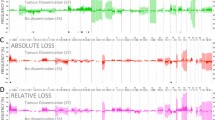Abstract
Background: The role of genes on chromosome 13q has not been confirmed in colorectal tumors, in part because most series that have been studied are heterogeneous in terms of tumor site, stage, and replication error (RER) status. Using a highly homogenous series of colon tumors, our aim was to identify areas of interest on 13q that are important in carcinogenesis.
Methods: Twenty-three RER-negative tumor specimens from patients with right-sided Dukes’ stage C colon tumors were selected for analysis with 10 microsatellite markers spanning 13q. The polymerase chain reaction–amplified products were analyzed by using a standard fluorescent loss of heterozygosity/allele imbalance assay.
Results: Markers showing the highest frequency of allelic imbalance were as follows: D13S175 (31%), D13S289 (27%), D13S263 (25%), and D13S265 (27%). The overall resolution of the map was approximately 11.4 to 11.7 cM.
Conclusions: This study of right-sided, RER-negative, Dukes’ stage C colon tumors showed the highest area of allelic imbalance corresponding to 13q11.2–11. This region includes LATS2 (large tumor suppressor 2 gene) and FGF9 (fibroblast growth factor 9), which may be involved in carcinogenesis.
Similar content being viewed by others
REFERENCES
Vogelstein B, Fearon ER, Kern SE, et al. Allelotype of colorectal carcinomas. Science 1989;244:207–11.
Fearon ER, Vogelstein B. A genetic model for colorectal tumourigenesis. Cell 1990;61:759–67.
Tomlinson I, Ilyas M, Johnson V, et al. A comparison of the genetic pathways involved in the pathogenesis of three types of colorectal cancer. J Pathol 1997;184:148–52.
Ried T, Knutzen R, Steinbeck R, et al. Comparative genomic hybridisation reveals a specific pattern of chromosomal gains and losses during the genesis of colorectal tumours. Genes Chromosomes Cancer 1996;15:234–45.
Meijer GA, Hermsen MA, Baak JP, et al. Progression from colorectal adenoma to carcinoma is associated with non-random chromosomal gains as detected by comparative genomic hybridisation. J Clin Pathol 1998;51:901–9.
Ookawa K, Sakamoto M, Hirohashi S, et al. Concordant p53 and DCC alterations and allelic losses on chromosome 13q and 14q associated with liver metastases of colorectal carcinoma. Int J Cancer 1993;53:382–7.
Nakao K, Shibusawa M, Ishihara A, et al. Genetic changes in colorectal carcinoma tumours with liver metastases analysed by comparative genomic hybridisation and DNA ploidy. Cancer 2001;91:721–6.
Lothe RA, Fossli T, Danielsen HE, et al. Molecular genetic studies of tumour suppressor gene region on chromosome 13 and 17 in colorectal tumours. J Natl Cancer Inst 1992;84:1100–8.
Lindblom A. Different mechanisms in the tumourigenesis of proximal and distal colon cancers. Curr Opin Oncol 2001;13:63–9.
Kapiteijn E, Liefers GJ, Los LC, et al. Mechanisms of oncogenesis in colon versus rectal cancer. J Pathol 2001;195:171–8.
Distler P, Holt PR. Are right- and left-sided colon neoplasms distinct tumors? Dig Dis 1997;15:302–11.
Cawkwell L, Bell SM, Lewis FA, Dixon MF, Taylor GR, Quirke P. Rapid detection of allele loss in colorectal tumours using microsatellites and fluorescent DNA technology. Br J Cancer 1993;67:1262–7.
Cawkwell L, Lewis FA, Quirke P. Frequency of allele loss of DCC, p53, RB1, WT1, NF1, NM23 and APC/MCC in colorectal cancer assayed by fluorescent multiplex polymerase chain reaction. Br J Cancer 1994;70:813–8.
Skotheim RI, Diep CB, Kraggerud SM, Jakobsen KS, Lothe RA. Evaluation of loss of heterozygosity/allelic imbalance scoring in tumour DNA. Cancer Genet Cytogenet 2001;127:64–70.
Fujiwara Y, Emi M, Ohata H, et al. Evidence for the presence of two tumour suppressor genes on chromosome 8p for colorectal carcinoma. Cancer Res 1993;53:1172–4.
Ishizaki K, Fujimoto J, Kumimoto H, et al. Frequent polymorphic changes but rare tumour specific mutations of the LATS 2 gene on 13q11–12 on oesophageal squamous cell carcinoma. Int J Oncol 2002;21:1053–7.
Wildrick DM, Boman BM. Does the human retinoblastoma gene have a role in colon cancer? Mol Carcinog 1994;10:1–7.
Gope R, Christensen MA, Thorson A, et al. Increased expression of the retinoblastoma gene in human colorectal carcinomas relative to normal colonic mucosa. J Natl Cancer Inst 1990;82:310–4.
Chen-Shtoyerman R, Figer A, Fidder HH, et al. The frequency of the predominant Jewish mutations in BRCA1 and BRCA2 in unselected Ashkenazi colorectal cancer patients. Br J Cancer 2001;84:475–7.
Drummond F, Putt W, Fox M, Edwards YH. Cloning and chromosome assignment of the human CDX2 gene. Ann Hum Genet 1997;61:393–400.
Ee HC, Erler T, Bhathal PS, Young GP, James RJ. Cdx-2 homeodomain protein expression in human and rat colorectal adenoma and carcinoma. Am J Pathol 1995;147:586–92.
Chawengsaksophak K, James R, Hammond VE, Kontgen F, Beck F. Homeosis and intestinal tumours in Cdx2 mutant mice. Nature 1997;386:84–7.
Wicking C, Simms LA, Evans T, et al. CDX2, a human homologue of Drosophila caudal, is mutated in both alleles in a replication error positive colorectal cancer. Oncogene 1998;17:657–9.
Sarela AI, Farmery SM, Markham AF, Guillou PJ. The candidate tumour suppressor gene, ING1, is retained in colorectal carcinoma. Eur J Cancer 1999;35:1264–7.
Author information
Authors and Affiliations
Corresponding author
Rights and permissions
About this article
Cite this article
Sivarajasingham, N.S., Baker, R., Tilsed, J.V. et al. Identifying a Region of Interest in Site- and Stage-Specific Colon Cancer on Chromosome 13. Ann Surg Oncol 10, 1095–1099 (2003). https://doi.org/10.1245/ASO.2003.03.004
Received:
Accepted:
Issue Date:
DOI: https://doi.org/10.1245/ASO.2003.03.004




